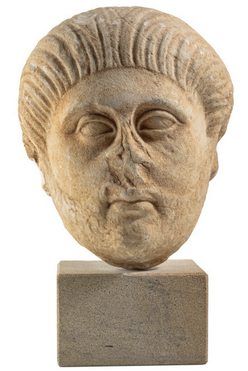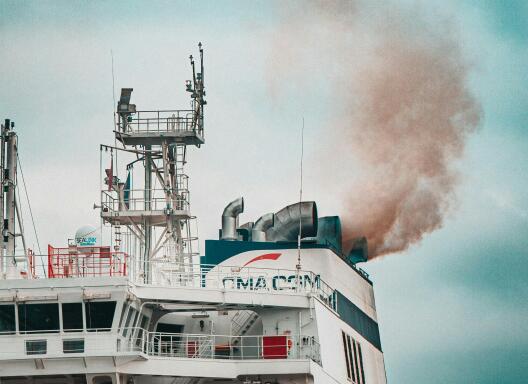












Our Moon was formed through a massive collision with a Mars-sized protoplanet. In the aftermath of its formation, the Moon was largely molten and has been slowly cooling ever since. As it contracts, its volume decreases, leading to tectonic deformations on its surface. This process is particularly visible through the formation of thrust faults, known as lobate scarps – some of the Moon’s youngest geological structures.
In his master’s thesis, Thomas Früh studied small, meter-sized graben that appear on these lobate scarps. By comparing them to similar structures in Australia and Africa, he helped identify potential formation mechanisms. The work was carried out on his own initiative and in collaboration with the Institute of Geology & Palaeontology and the Institute of Planetology. It has now been published in the international journal Icarus.
"Small graben on large thrust faults indicate that tectonic activity on the Moon is ongoing. This is an important clue that other moons and planets could still be geologically active as well," Frueh explains.

On February 20 and 21, the annual meeting of the German Stratigraphic Commission (DSK) will take place in Münster for the first time. The event is being organized by the AG Paläontologie under the direction of Prof. Becker, the current DSK chairman.
Further information on the DSK and the annual meeting in Münster can be found here.

Baden-Württembergs Ministerpräsident Winfried Kretschmann sorgte im Januar für Gesprächsstoff im Fachbereich Geowissenschaften (FB14). In einem Online-Artikel zur Schulpolitik wurde er mit einer Aussage zitiert, die das Schulfach Geographie auf Kartenlesen reduziert. Als Reaktion auf diese Aussage positionieren sich 17 Professor*innen des FB14 in einem offenen Brief: "Geographie bleibt entscheidend, um globale Zusammenhänge zu verstehen" und um "Antworten auf die drängendsten Fragen unserer Zeit liefern zu können".
Der offene Brief wird in der neusten Ausgabe der Unizeitung wissen|leben vorgestellt. Hier finden Sie den Artikel zum offenen Brief in der wissen|leben.

We congratulate Dr. Kyra Hölzer on the successful completion of her doctorate on January 8, 2025. With her dissertation on “Constraining exhumation histories in the European Alps using thermochronology and thermokinematic modeling (PECUBE)” she has made a significant contribution to research in this field.
We wish her all the best and every success in her future career!

Stony corals can survive in nutrient-poor, tropical seas because they form a special symbiosis with photosynthetic microorganisms. This partnership has a long history - but it was previously unclear how far back in Earth's history it goes. An international research team has now shown that some coral species already hosted photosymbionts 385 million years ago.
Dr. Till Söte contributed to the current Nature paper during his doctorate at the Institute of Geology and Palaeontology at the University of Münster.

The University of Münster has now returned a marble head of unknown origin to the Greek state. The University's Archaeological Museum was given the head from a private collection in Essen in 1989, but it remains unclear how the donors obtained the ancient piece, who removed it from its original location and when it was removed.
Prof. Dr. Laura Stutenbecker and Prof. Dr. David De Vleeschouwer examined the composition of the marble and compared it with analyses carried out last year on selected marble objects in the Archaeological Museum in Thessaloniki.

The international maritime shipping industry contributes to air pollution, particularly in coastal areas and port cities. A research team led by Prof. Dr. Christine Achten has analysed the wastewater from exhaust gas cleaning systems for their contamination with polycyclic aromatic hydrocarbons and their toxicity. This is one of the most comprehensive studies on this topic.

Are you interested in studying geosciences at the University of Münster? Are you just starting your studies and want to find out everything about the Bachelor's programme or are looking for a Master's programme?
Here you will find up-to-date information on the Bachelor's and Master's degree programmes in Geosciences.

The Water Sciences degree programme is a cooperative Master's degree programme between various departments at Münster University and Münster University of Applied Sciences, in which the Institute of Geology and Palaeontology is also a involved partner.
Further information on the Water Sciences degree programme can be found here.

It is an important concern of the Institute of Geology and Palaeontology to establish a close and long-lasting relationship with its alumni*ae. The common ground of all alumni*ae is to have studied in Münster and to have written a thesis at the Institute of Geology and Palaeontology or to have worked at the institute.
If you are interested, you can register here free of charge:
Alumni*ae network of the Institute of Geology and Palaeontology